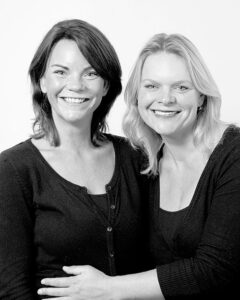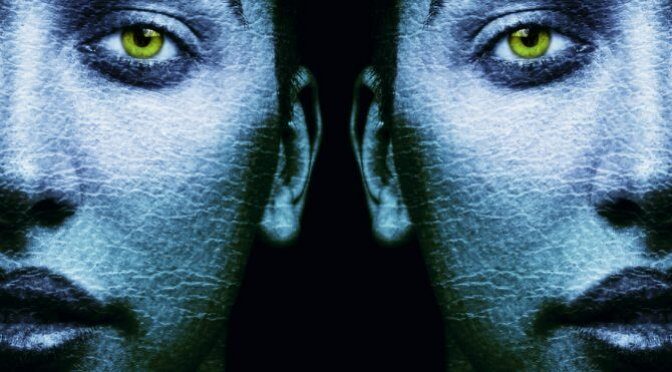If anyone has ever told you that they’ve just seen your double, or if you’ve ever seen a double of a friend or family member, you’ll be familiar with the odd sensation that accompanies this revelation. It’s a scenario that can suddenly strike doubt into your day and make you question reality a little bit. Your identity suddenly not so unique, an imposter in your midst!
One artist, Francois Brunelle, began a project exploring this weird phenomenon. Find some of his work in this article, and more here!
A Brief History of Doppelgängers

In traditional folklore, a doppelgänger is somebody’s double, sometimes considered an evil twin or even a harbinger of bad luck.
From the German words Doppel (double) and gänger (goer or walker), the doppelgänger is a concept that has been seen time and again in different stories and myths from many cultures around the world. However, a mid-19th-century book called ‘The Night Side of Nature’ by Catherine Crowe, which dealt with paranormal phenomena, popularized the German word and brought it to mass consciousness.
Typically, in many tales involving these apparitions, seeing a doppelgänger of a friend or relative is thought to mean that ill health is about to befall them. Seeing one’s own doppelgänger is an omen of death.
We can find doubles in stories as far back as ancient Egyptian mythology and Norse folklore. Clearly, doppelgängers are a phenomenon that humans have been experiencing and writing about for a very long time. So are they something that we as humans are predisposed to come across in our lives?
How Do We Recognize Faces?

We can turn to science to get a better understanding of how we interpret faces, and as such, how doppelgängers come to be part of our day-to-day. Daniele Podini from George Washington University is an expert in facial recognition, and he says that our perception of faces is “filtered by our own experiences.”
This, in turn, creates a bias in the way we comprehend faces. We try and read new faces in such a way as to understand them in comparison to the faces we already have ‘stored’ on memory.
Podini goes on to explain that a person’s face is almost like a code for our brain to decipher and interpret. Each person will crack the code in a different way – some people look from the eyes to the nose to the mouth, while another may notice the mouth first.
The size, shape, and placement of each facial feature will have a large impact upon how we interpret the following features. As such, it takes only a couple of vaguely similar features to create a ‘recognition’ of a stranger’s face.
This also explains why people may dispute the similarity between two people. If you were to show a person their doppelgänger, they could see an entirely different person, all because they noticed the nose of the person before their eyes – the first feature you had picked out. This, of course, all happens in fractions of a second – barely noticeable and almost impossible to re-learn.
How Do We Tell One Another Apart?

Humans have an evolutionary advantage in being able to tell faces apart. In the past, it meant that we could easily tell our friends from our foes. It was, and remains, vital for social interactions between people. The differences in our behavior around strangers in comparison to old friends is an example of this skill’s importance.
As a species, we have developed an area of the brain known as the ‘fusiform face area’ which helps us distinguish between faces. However, Marlene Behrman, a researcher of prosopagnosia (face blindness) at Carnegie Mellon University, says this vital distinguishing skill is “actually very hard for us.”
Michael Sheehan from Cornell University, explains that faces evolved the way they did due to the importance of individuality and diversity in the human race. He noticed that the range of differences and intricacies is something not seen in other animal species.
So, with intuitive facial recognition and such an array of faces in the world, why do doppelgängers still stump us?
What Causes The Appearance of Doppelgängers?

One of the main theories behind what leads to people seeing doppelgängers is that, as humans, we are very susceptible to something called the ‘confirmation bias.’ Essentially, our brains seek and favor information that confirms that which we already know, and will often conveniently ‘forget’ details that don’t align with our beliefs.
Placing this in the context of recognizing physical traits in other people, we might see a person with a similar hairstyle to someone we know and then start to pick out other details about them that match our friend. Both may have a pierced nose and share the same dress sense, but we’ll ignore the entirely different eyebrows and chin because we have already associated them with our friend. We subconsciously want them to be the same.
A different approach from Sheehan theorizes that doppelgängers could just be down to something as simple as our genes “running out of options.” Sheehan likens it to a Rubik’s Cube, “You can get a lot of variation [however] there’s sort of a numbers game to it.” Eventually, people are going to end up looking very similar, and now it is more likely than ever that you could see, or even meet your doppelgänger with an ever-increasingly connected world.
The main difficulty when considering the science of doppelgängers is its subjectivity. It is almost impossible to say objectively that one person looks the same as another, particularly when mannerisms or personality traits come in and affect our perceptions.
Seeing Double?
Doppelgängers appear to allude science a little. After all the scientific research it seems as though doppelgängers well and truly walk among us. However, perhaps we’re creating these strange creatures in our very own minds, allowing doppelgängers to enter into our world, though hopefully not as omens of death.
This article was written by The Hearty Soul. The Hearty Soul is a rapidly growing community dedicated to helping you discover your most healthy, balanced, and natural life.
Sources:
http://scienceline.org/2014/03/do-doppelgangers-exist/
http://www.nature.com/ncomms/2014/140916/ncomms5800/full/ncomms5800.html
http://www.nature.com/ncomms/2014/140916/ncomms5800/full/ncomms5800.html
https://www.verywell.com/what-is-a-confirmation-bias-2795024
http://www.telegraph.co.uk/science/2016/03/15/could-you-track-down-your-doppelganger/
http://www.ancient-origins.net/myths-legends/doppelgangers-and-mythology-spirit-doubles-001825
http://www.francoisbrunelle.com/web/francois_brunelleindex.html

